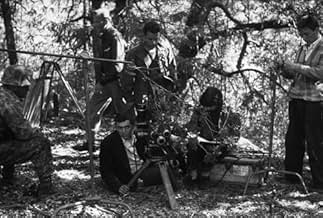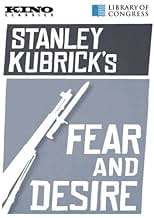IMDb-BEWERTUNG
5,3/10
14.239
IHRE BEWERTUNG
Vier hinter den feindlichen Linien eingekesselte Soldaten müssen sich ihren Ängsten und Sehnsüchten stellen.Vier hinter den feindlichen Linien eingekesselte Soldaten müssen sich ihren Ängsten und Sehnsüchten stellen.Vier hinter den feindlichen Linien eingekesselte Soldaten müssen sich ihren Ängsten und Sehnsüchten stellen.
- Auszeichnungen
- 1 Nominierung insgesamt
Stephen Coit
- Fletcher
- (as Steve Coit)
- …
David Allen
- Narrator
- (Synchronisation)
Toba Kubrick
- Woman Fishing in the River
- (Nicht genannt)
Handlung
WUSSTEST DU SCHON:
- WissenswertesStanley Kubrick later denounced this film as amateurish, saying he considered it like a child's drawing on a fridge.
- PatzerThe lieutenant and Fletcher approach the house and are seen from behind standing on a well-tended lawn. The front shot shows them standing on uneven ground with tall straggly weeds.
- Zitate
Lieutenant Corby: Well, we have nothing to lose but our futures.
- Crazy CreditsPreserved by the Library of Congress - Packard Campus for Audio Visual Conservation
- Alternative VersionenBlu-ray Disc releases in America also include The Seafarers, a short film from Kubrick, as a bonus feature. The European Masters of Cinema release also includes two additional shorts, Day of the Fight and Flying Padre.
- VerbindungenEdited into Gli ultimi giorni dell'umanità (2022)
Ausgewählte Rezension
Let me preface this review with one simple statement: Stanley Kubrick is god. I'm a rabid fan, the man could do no wrong, and his death was the greatest loss that film has ever known -- every other director moved up a notch when Stanley went, because Mr. Kubrick was, is and always will be number one...
That said -- it was actually heartening to see "Fear and Desire" and to realize that the film pretty much sucks. In other words, even genius has to be born somewhere, and in his first feature, Mr. Kubrick just didn't have it yet. Pretty much a still "Life" photog at the time, "Fear and Desire" comes across as a pretentious student film, albeit a well shot one. However, this is in the days before Kubrick developed his own style, and so anything eye-catching in this movie is by way of Sergei Eisenstein. At times, the influence is painfully obvious, as in a sequence in which our lead soldiers make a raid on a house held by the enemies -- it might as well be a re-take of "Potemkin," sans the steppes and the lady with the busted glasses. But, the jump cuts, the creation of scene through editing, the visual ellipses is entirely Eisenstein and none at all Kubrick, and the effect is jarring.
Not that there aren't points to recommend in the film. Oddly enough, a very young Paul Mazursky turns in a wonderful performance as a soldier who cracks under the stress of it all, and Kubrick stages what's basically a rape scene under the constraints of 50s censorship, while infusing it with so much eroticism that it's rather uncomfortable. (Side note to Adam Sandler: if you ever chose to go into drama, study Mazursky's role in this film -- it's everything you could be if you give up the "dumb but pure" roles of "Wedding Singer" and "The Water Boy.")
Pluses in the film are that it deals with the subject of war without ever identifying sides -- there's a vague Prussian-ness about the villains, but if you look closely, none of the soldiers are identified by country. Kubrick also pulls off some interesting double casting in which the leads play the "villains," but are not obviously the same people. On the down side, the film opens and closes with possibly the most pretentious voice over narration ever committed to celluloid. There's a BIG IDEA working here, but given that Kubrick was only 24 when he made the film, it's understandable that the Ooh-Aah idea wasn't really as big as he thought it was. (Then, again, making an anti-war movie during the Korean war was probably about as egregious as one could get. I wouldn't know, I wasn't alive in 1953.)
All of this said -- for film students and Kubrick fans, this film is a must-see if you can track it down -- and good luck trying, since Mr. Kubrick wisely killed all availability of the movie. In a lot of ways, it's actually a very encouraging experience to see a genius like Mr. Kubrick churn out absolute crap -- brilliant moments that add up to nothing. Given his career since this film, it just shows that everyone has to start somewhere, and even the (arguably) greatest director in the history of cinema was once just a young schmuck with a camera, film and some actors.
That said -- it was actually heartening to see "Fear and Desire" and to realize that the film pretty much sucks. In other words, even genius has to be born somewhere, and in his first feature, Mr. Kubrick just didn't have it yet. Pretty much a still "Life" photog at the time, "Fear and Desire" comes across as a pretentious student film, albeit a well shot one. However, this is in the days before Kubrick developed his own style, and so anything eye-catching in this movie is by way of Sergei Eisenstein. At times, the influence is painfully obvious, as in a sequence in which our lead soldiers make a raid on a house held by the enemies -- it might as well be a re-take of "Potemkin," sans the steppes and the lady with the busted glasses. But, the jump cuts, the creation of scene through editing, the visual ellipses is entirely Eisenstein and none at all Kubrick, and the effect is jarring.
Not that there aren't points to recommend in the film. Oddly enough, a very young Paul Mazursky turns in a wonderful performance as a soldier who cracks under the stress of it all, and Kubrick stages what's basically a rape scene under the constraints of 50s censorship, while infusing it with so much eroticism that it's rather uncomfortable. (Side note to Adam Sandler: if you ever chose to go into drama, study Mazursky's role in this film -- it's everything you could be if you give up the "dumb but pure" roles of "Wedding Singer" and "The Water Boy.")
Pluses in the film are that it deals with the subject of war without ever identifying sides -- there's a vague Prussian-ness about the villains, but if you look closely, none of the soldiers are identified by country. Kubrick also pulls off some interesting double casting in which the leads play the "villains," but are not obviously the same people. On the down side, the film opens and closes with possibly the most pretentious voice over narration ever committed to celluloid. There's a BIG IDEA working here, but given that Kubrick was only 24 when he made the film, it's understandable that the Ooh-Aah idea wasn't really as big as he thought it was. (Then, again, making an anti-war movie during the Korean war was probably about as egregious as one could get. I wouldn't know, I wasn't alive in 1953.)
All of this said -- for film students and Kubrick fans, this film is a must-see if you can track it down -- and good luck trying, since Mr. Kubrick wisely killed all availability of the movie. In a lot of ways, it's actually a very encouraging experience to see a genius like Mr. Kubrick churn out absolute crap -- brilliant moments that add up to nothing. Given his career since this film, it just shows that everyone has to start somewhere, and even the (arguably) greatest director in the history of cinema was once just a young schmuck with a camera, film and some actors.
Top-Auswahl
Melde dich zum Bewerten an und greife auf die Watchlist für personalisierte Empfehlungen zu.
- How long is Fear and Desire?Powered by Alexa
Details
Box Office
- Budget
- 33.000 $ (geschätzt)
- Weltweiter Bruttoertrag
- 953 $
- Laufzeit1 Stunde 2 Minuten
- Farbe
- Seitenverhältnis
- 1.37 : 1
Zu dieser Seite beitragen
Bearbeitung vorschlagen oder fehlenden Inhalt hinzufügen



























